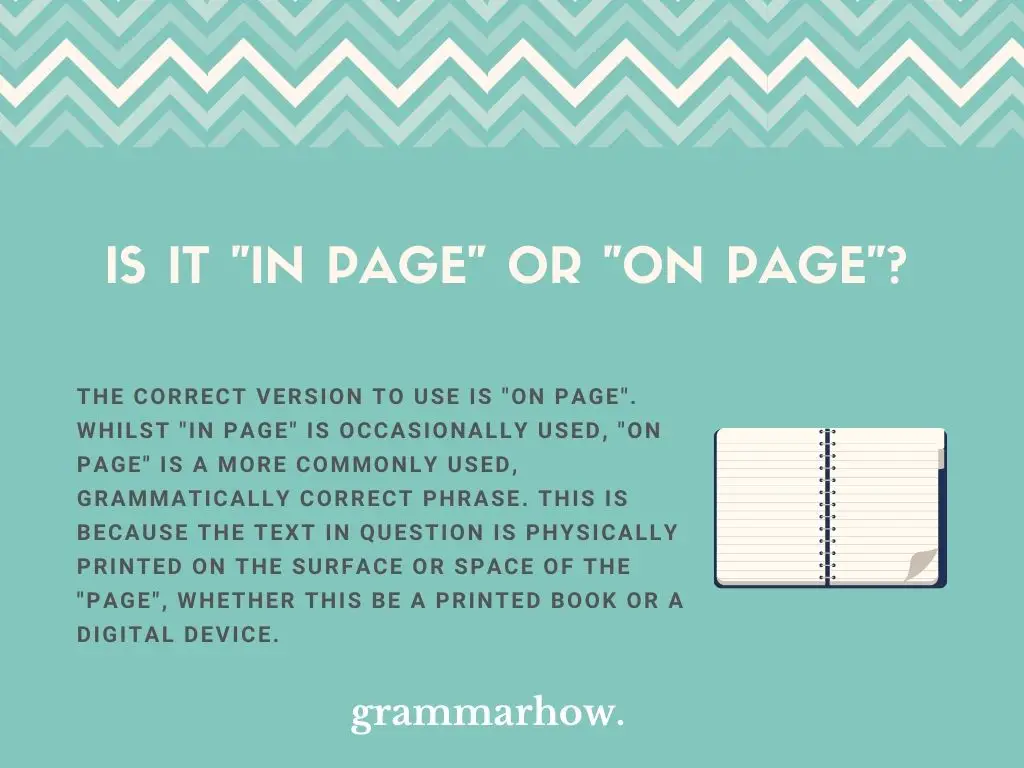Readers and writers everywhere can find the difference between two phrases “in page” and “on page” a subject of confusion. This brief article will define the correct version to use, along with useful sentence examples to show how to use the correct version in writing and conversation.
Is It “In Page” Or “On Page”?
The correct version to use is “on page”. Whilst “in page” is occasionally used, “on page” is a more commonly used, grammatically correct phrase. This is because the text in question is physically printed on the surface or space of the “page”, whether this be a printed book or a digital device.

To reiterate, the phrase “on page” should be used in documents that feature pages, including websites.
If something was referred to as “in page”, this would incorrectly suggest “inside”. Text could be printed inside a graph on a page, but the text is not “in” the “page” itself.
Examples Of How To Use “In Page” And “On Page” In A Sentence
To help you to work out the difference between “in page” and “one page” in a sentence, consult the following helpful correct and incorrect sentence examples:
- Correct: On page 3, Sarah could clearly see that the author had provided a full biographical history of George Clooney.
- Incorrect: In page 10, Julia found an error, and quickly tried to correct it before handing it to her teacher for the annual exam.
- Correct: She stared at the equation on page 10, but still could no understand it fully, even with the help of her friends in the same maths group.
- Incorrect: The text in page 9 was difficult to understand, and Matt had to ring a friend for example help with the exam question.
- Correct: Something was clearly missing on page 37; John would have to rewrite the entire page again so it makes sense.
- Incorrect: Someone had written their own notes in the first page of the hardback book; Sophie decided to copy them to improve her work.
How Prevalent Is The Usage of “In Page” Compared To “On Page”?
The phrase “on page” is used more than the phrase “in page”.
This graph from Google Ngram Viewer shows the usage of the phrases “on page” and “in page” in the period 1800 to 2019. The line in red represents the usage of “on page” and the line in blue represents “in page”.

As you can understand from observing the graph, the phrase “on page” is the phrase used the most out of the two. Usage of the phrase “on page” has, however, been steadily declining from 1945. to 2019.
Is It “In The Last Page” Or “On The Last Page”?
The correct version to opt for out of “in the last page” and “on the last page” is “on the last page”. Just like the simple phrase “on page”, “on” should also be used in this instance when referring to a physical page or an online page.
Do not write or say “in the last page”, because this phrase would not make sense in the sentence.
To help you to understand why “on the last page” is correct, check out these simple correct and incorrect sentence examples:
- Correct: On the last page of the large book Sarah found a long poem written by every member of the poetry group.
- Incorrect: In the last page of the textbook, Dan soon found all of the equation examples that he need to help him to complete the exam.
Is It “In The Next Page” Or “On The Next Page”?
The correct version to opt for out of “in the next page” and “on the next page” is “on the next page”. Just like the simple phrase “on page”, “on” should also be used in this instance when referring to a physical page or an online page.
Remember not to write or say “in the next page”, because this phrase would result in a sentence that makes no sense.
In this instance, to further aid your understanding of why “on the last page” is correct, note the following colloquial correct and incorrect sentence examples:
- Correct: On the next page Jack was able to find all of the correct information that the company needed to move forward.
- Incorrect: In the next page Sarah was stunned and horrified by the lengthy report about the recent burglary.
